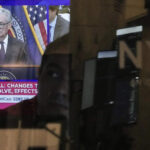Nvidia’s ambitious announcement regarding a potential $100 billion investment in OpenAI underscored the escalating momentum of artificial intelligence (AI) technologies. This investment comes amid a continued surge in Nvidia’s stock, which rose nearly 4% following the news, propelling the S&P 500 to unprecedented heights. Despite the jubilant market response, seasoned investors raised alarms, drawing parallels to previous market bubbles.
Nvidia’s investment is intended to bolster the establishment of extensive data centers powered by Nvidia’s AI processors. However, some analysts warn that this partnership might reflect a troubling trend known as vendor financing. Essentially, Nvidia is providing funds to OpenAI so that it can in turn purchase Nvidia products, which raises questions about the sustainability of such a business model. Bespoke Investment Group expressed concerns that OpenAI is “selling itself off to a supplier in order to fund its investments,” suggesting that Nvidia’s move is more about securing future revenue than fostering genuine growth in the AI sector.
Famed short seller Jim Chanos also voiced skepticism regarding Nvidia CEO Jensen Huang’s assertions about the costs associated with building significant data center capacity. According to Chanos, the projected costs of $50-$60 billion for one gigawatt of data center capacity are considerably higher than those reported by other players in the industry. He referenced the incomplete nature of the deal between Nvidia and OpenAI as reminiscent of the memorandums of understanding that characterized the heights of the Dotcom bubble.
The historical context is further complicated by the echoes of the past, with experts recalling how vendor financing contributed to the unraveling of the Dotcom bubble. In that era, companies like Lucent Technologies offered substantial loans to smaller telecom carriers, which used the funds to purchase equipment from Lucent, resulting in inflated revenue without corresponding genuine sales growth. Peter Boockvar, Chief Investment Officer at One Point BFG Wealth Partners, highlighted these parallels, emphasizing that the financial dynamics at play in the current AI market are disturbingly reminiscent of those during the Dotcom boom.
Despite the current enthusiasm surrounding AI technologies, analysts insist that for this multi-billion-dollar venture to succeed, OpenAI and similar firms must generate substantial revenues to align with their investments and obligations. As market dynamics evolve, Nvidia shares saw a slight pullback of more than 2% on Tuesday, indicating a shift in investor sentiment as concerns surrounding the sustainability of this model gained traction. Meanwhile, Oracle, which has also been viewed as a key player in the AI landscape, experienced a 4% decline, further emphasizing the uncertain climate surrounding AI investments.







